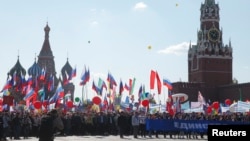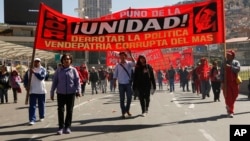May 1st or May Day was observed in many countries Sunday with workers and activists marching in the streets and gathering in city centers to honor laborers all over the world.
This year, the day fell on Sunday. But that did not dampen the resolve of those who rallied in support of workers' rights.
In the United States, thousands of people rallied at events around the country for immigrant and worker rights. Activists also spoke out against what they see as hateful presidential campaign rhetoric.
Police used pepper spray to beat back rowdy May Day protesters in the northwestern city of Seattle. Police arrested nine people and five police officers were hurt in the fracas, officials said.
Seattle Mayor Ed Murray blamed the "senseless violence" on a "different crowd" from those who attended a peaceful May Day observation earlier Sunday.
In Los Angeles, some May Day demonstrators carried Mexican flags and signs that said "Dump Trump," a reference to Donald Trump, the front-running Republican presidential candidate who wants to build a wall between Mexico and the U.S. to stop illegal immigration.
Higher wages, better conditions
From Moscow to Madrid, workers shouted their demands for higher wages, better conditions and more job security as many countries battle economic uncertainty and high unemployment.
French and Turkish police fired tear gas at protesters as tensions erupted in both of those countries.
Thick clouds of tear gas hung above the Place de la Nation square in Paris where youths in balaclavas and ski masks hurled cobblestones and bottles at black-clad riot troops shouting: "Everyone hates the police."
Police estimated some 17,000 protesters marched throughout the French capital for a rally riding a wave of anger against planned labor reforms set to come before the French parliament Tuesday. Ten people were arrested.
Turkish police and protesters clashed in Istanbul as several dozen people tried to reach the city's Taksim Square, where festivities were banned.
Workers across Asia called for higher wages and better working conditions in their rallies.
In South Korea, tens of thousands of people protested the government's labor reform plans. Labor leaders said a bill being pushed by President Park Geun-hye and her conservative Saenuri Party would make it easier for companies to lay off workers.
In Malaysia, trade union president Abdullah Sani criticized the Trans-Pacific Partnership (TPP) agreement, saying unions fear its effects on workers. The TPP is a multilateral free trade agreement, led by the United States, and signed by 12 countries in February. It is undergoing a two-year ratification process.
In Indonesia, workers called for higher wages to improve the quality of their lives. Indonesia has nearly 111 million workers, but almost half of them are low-skilled laborers.
In Taipei, thousands of protesters from different labor groups called for raising the minimum wage and shorter working hours.
Garment factory workers rallied in Cambodia.
May Day coincided with the Orthodox Easter in Russia this year.
A cease-fire was set to begin Sunday in Ukraine, which also celebrated the start of the Orthodox Easter and May Day holidays.
A Ukraine official said three people were killed in fighting Sunday in the country's east, including the suburbs of rebel stronghold Donetsk, despite the agreement.
And in the United States, thousands of people were expected to rally at events from New York to Los Angeles for immigrant and worker rights. They also planned to speak out against what they see as hateful presidential campaign rhetoric.
Thousands of people took to the streets across major cities in Latin America to celebrate May Day and demand social improvements in their countries.
In Chile's capital, Santiago, demonstrators held marches days after the country's constitutional court struck down a bill that would give workers more rights to negotiate with employers, one of the key issues of labor reforms that President Michelle Bachelet has been pushing. Some protesters later clashed with riot police, who used tear gas and a water cannon truck to disperse the crowd.
In Bolivia, President Evo Morales signed several decrees to benefits workers across the Andean nation. One of them raises minimum wages, a move highly rejected by the country's private sector.
Thousands of demonstrators gathered in Mexico City to mark Labor Day and demand better working conditions. Union members marched through Paseo de la Reforma, one of the main avenues in the city, carrying banners and flags.
In Brazil, embattled President Dilma Rousseff used a Labor Day appearance in Sao Paulo to rally support against efforts to impeach her. The president announced to tens of thousands of backers that she will beef up a flagship social program, reduce the impact of income tax on the middle class and build another 25,000 new low-price homes.
A key vote on her impeachment proceedings is scheduled within two weeks in the Brazilian senate.








